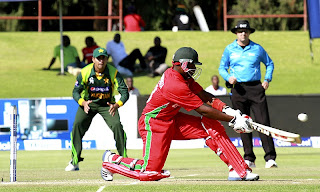HARARE: Having beaten Pakistan by seven wickets in the first
match, hosts Zimbabwe are a win away from claiming their first ODI
series win over the same opponents and with it their first significant
bilateral series in 12 years when they take to the field for the second
ODI at the Harare Sports Club on Thursday.
Following the 5-0 sweep at the hands of a weakened India last month,
Brendan Taylor’s team are now in the rare position to press for an epic
series win over top-class opposition.
Zimbabwe have never beaten Pakistan in bilateral ODI series dating
back to 1993; they have lost eight and drawn one series 1-1 in 1995.
“We know how good Pakistan are and we know the quality of their
players, we know they are going to come back harder on us,” said
Zimbabwe batsman Malcolm Waller.
Tuesday’s victory was Zimbabwe’s first over Pakistan in 15 years, but
it remains to be seen if they can reproduce such a performance a second
time in less than three days.
The win was fashioned in the field where Pakistan lost five wickets
for 44 runs after being given a 99-run stand for the third wicket and
could only manage 244, a total that Zimbabwe overhauled with ten
deliveries remaining.
Medium-pacers Brian Vitori and Tendai Chatara were economical and
claimed two wickets each as Pakistan’s batsmen, barring Mohammad Hafeez
and Misbah-ul-Haq, struggled to dominate.
These two bowlers will need to be frugal again, while the support act
must be sharper. A repeat act of their fine fielding — Prosper Utseya’s
one-handed stunner was jaw-dropping — would only give Zimbabwe more of
an edge.
“To beat the quality team that Pakistan have got shows that we are
doing the right things,” Taylor said after Tuesday’s match. “But there
is still room for improvement; we dropped some pretty easy catches.”
Half-centuries for Vusi Sibanda and Hamilton Masakadza paved the way
for a historic chase before skipper Taylor added the final touches.
Considering the magnanimity of the last win, its unlikely Zimbabwe will
tinker with their line-up.
For Pakistan, the sloppy batting and lacklustre bowling will be a concern.
Openers Nasir Jamshed and Ahmed Shehzad were far from fluent while the lower middle order managed 20 runs between them.
Batting has for long been Pakistan’s problem and the way they
collapsed in Harare on Tuesday was just another example of adding to a
lost cause.
Pakistan also have a lot of experience in the form of captain
Misbah-ul-Haq and Shahid Afridi, but the latter has been inconsistent
with both the bat and the ball in recent times.
“I think we have to go back and think where we went wrong to really
improve our batting, bowling and fielding,” Misbah said looking ahead to
Thursday’s game. “We need to just come back strongly and play our A
game, our best game then you can really win these games.”
Pakistan are in the unfamiliar position of needing to beat a minnow
team to salvage a series, and how they retaliate adds to the appetizing
fixture.
Teams (likely):
ZIMBABWE: Vusi Sibanda, Hamilton Masakadza, Brendan Taylor
(captain/wicketkeeper), Timycen Maruma, Sean Williams, Malcolm Waller,
Elton Chigumbura, Prosper Utseya, Tinashe Panyangara, Tendai Chatara,
Brian Vitori.
PAKISTAN: Nasir Jamshed, Ahmed Shehzad, Mohammad Hafeez,
Misbah-ul-Haq (captain), Umar Amin, Shahid Afridi, Haris Sohail, Sarfraz
Ahmed (wicketkeeper), Saeed Ajmal, Junaid Khan, Mohammad
Irfan.—Agencies





